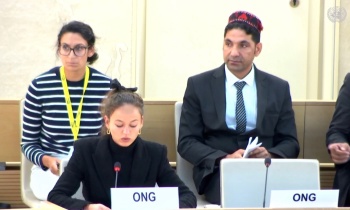QUNO’s Submission to the UN Special Rapporteur’s Report on Intersectionality from a Racial Justice Perspective

QUNO’s Human Rights and Refugees (HRR) programme recently provided a submission in response to a call for input by the UN Special Rapporteur on Contemporary Forms of Racism on the topic of intersectionality from a racial justice perspective. The purpose of the submission is to inform the Special Rapporteur’s upcoming report this topic to the 59th session of the Human Rights Council, which will take place from 16 June - 11 July 2025.
In their submission, HRR focused on how racism intersects with an individual’s migration status – actual or perceived – to exacerbate discrimination. It emphasized how racism creates situations of vulnerability for migrants and highlighted how race operates as a variable that compounds social inequities, injustices and oppression faced by migrants in the realization of their human rights.
In its recommendations, the submission outlined various actions States and other actors with a role in migration governance should take in order to centre anti-racism, decolonization and intersectionality in migration policies, laws, tools and practices. Within the UN system, for example, deliberate efforts should be undertaken to mainstream migration into work related to addressing racism and to actively address systemic racism through work on migration.
For States, recommendations included actions at both the national and international level. With the International Migration Review Forum (IMRF) coming up in 2026, States have a renewed chance to review progress towards the implementation of the Global Compact for Safe, Orderly and Regular Migration (GCM). Consequently, the submission recommended a series of actions for States to take in the lead up to the IMRF in order to contribute towards a convergence of racial justice and migration justice.
Importantly, HRR stressed that there can be no racial justice without migration justice and neither racial justice nor migration justice can be attained without the meaningful engagement and participation of individuals with direct expertise and lived experiences of racism and migration and migration in the development, implementation and evaluation of relevant laws, actions plans and/or policies. To ensure the meaningful participation of racialized migrants and those perceived as such, the submission’s recommendations for States, UN entities and other actors involved in migration governance drew from the enabling actions and transversal principles delineated in QUNO’s Migration Justice briefing paper series.
Overall, the submission’s focus and recommendations were in line with the HRR programme’s past work highlighting the relationship between systemic racism and human rights violations in the context of migration. During the 57th session of the Human Rights Council, for example, QUNO called on all States to develop and implement national action plans to eliminate racism and intersecting forms of discrimination in migration governance, including through proactive measures to counter dehumanizing narratives about migrants and migration. This statement was delivered by Kaya van der Horst, HRR Programme Assistant, during the General Debate on Item 9.
Both the submission and statement are available below to read and download. To read more about the HRR programme’s past work on racial justice and migration justice, see here, here, here, here, and here.


